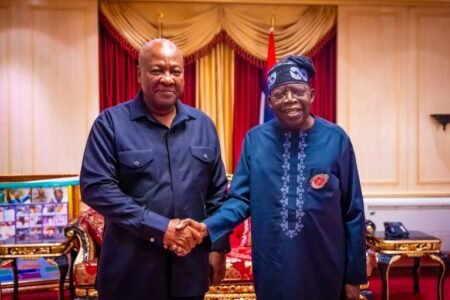President Bola Tinubu defended his four tax reform bills currently before the National Assembly on Monday.
Tinubu insisted that the bills, which have become a subject of heated debates with the North particularly rejecting them, are aimed at boosting the nation’s revenue.
He highlighted the importance of partnership, rather than confrontation, between the executive and legislative branches of government in moving the nation forward.
The President, represented by Dr. Joseph Ochoku, Director General of the Nigeria Institute of Peace and Conflict Resolution, spoke on Monday at the 7th annual Senator Abiola Ajimobi roundtable and 75th posthumous birthday of the late former governor of Oyo State at the University of Ibadan.
The Senator Abiola Ajimobi Foundation hosted the roundtable in partnership with the Institute for Peace and Strategies Studies at the University of Ibadan.
The theme was “Legislative Oversight in Nigeria: Challenges and Prospects.”
Speaking through Ochoku, Tinubu said, “My administration is determined to forge a harmonious relationship between the executive and the legislative arms of government.
“Despite occasional tensions, we recognise that effective governance is a shared responsibility. Collaboration, not confrontation, must define our interactions as we work towards the collective goal of improving the lives of our people.
“An example of this collaboration is the ongoing deliberation on the four proposed tax bills before the National Assembly.
“These reforms, when enacted, promise to streamline tax administration, enhance revenue generation, and promote equitable resource allocation.
“They are pivotal to our mission of building an inclusive, prosperous, and sustainable Nigeria and making our country competitive to attract foreign direct investment.”
Tinubu stated that his administration was fighting to protect the constitutional functions of each branch of government from primordial attitudes, and he emphasised support for press freedom.
“We also believe in press freedom and in holding government accountable. Thus, in our drive to deepen and consolidate the culture of democratic governance, we have been working assiduously to insulate the constitutional roles and functions of each arm of government from primordial sentiments, lack of engagement, and the dissemination of fake news and hate speeches,” he said.
Tinubu praised the late Ajimobi for leaving a legacy of infrastructure revitalisation, healthcare delivery, quality education, mechanised agriculture, peace, and security as a two-term governor of the state.
“He was a committed party man, with whom we formed the All Progressives Congress in 2013 to pursue people-centric economic growth and development, good governance, transparency, openness, accountability, and inclusivity.
“After serving in the legislative and executive arms of government, Ajimobi served briefly as the acting chairman of the APC before he succumbed to death on June 25, 2020,” he said.
In his remarks, Deputy President of the Senate Jibrin Barau explained the National Assembly’s choice to name its library after Tinubu.
He also affirmed the National Assembly’s commitment to oversight, calling it the foundation of democratic governance.
In a statement issued by his media aide, Ismael Mudashir, Barau stated that oversight ensures responsibility, transparency, and the necessary checks and balances that improve the efficient use of public monies.
Responding to questions from the roundtable participants, he explained why the National Assembly Library was named after Tinubu.
He said, “On the issue of the naming of the National Assembly Library, we decided to do that because we felt that it is the only time in history, the first time in history, that a former senator was elected to lead this country.
“Asiwaju Bola Ahmed Tinubu was a senator, and his wife was a senator. So, we felt these two things that happened in the National Assembly should be appreciated. And so, we decided to name the library after our dear president because of his history as a former senator.”











